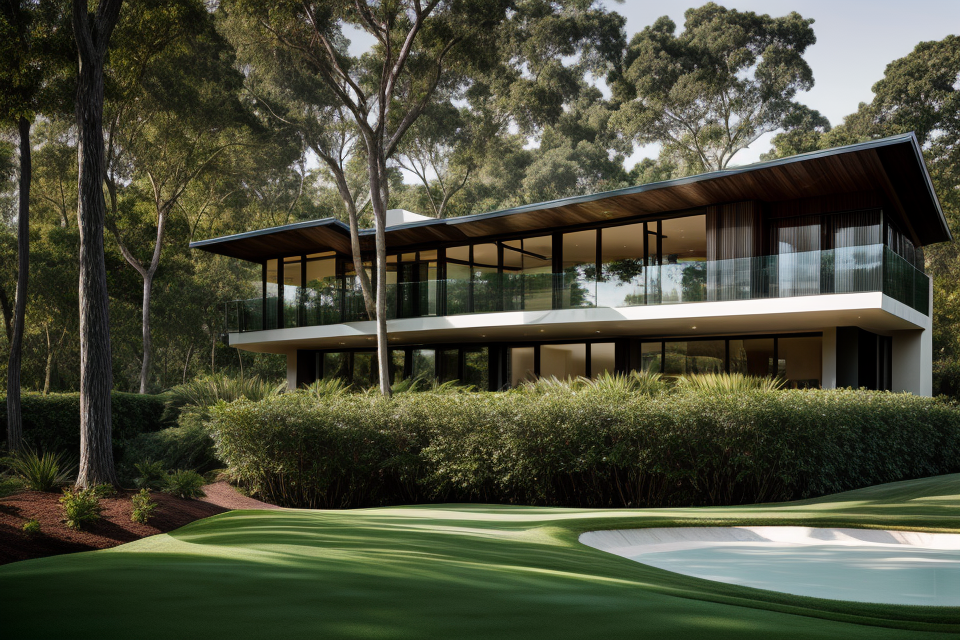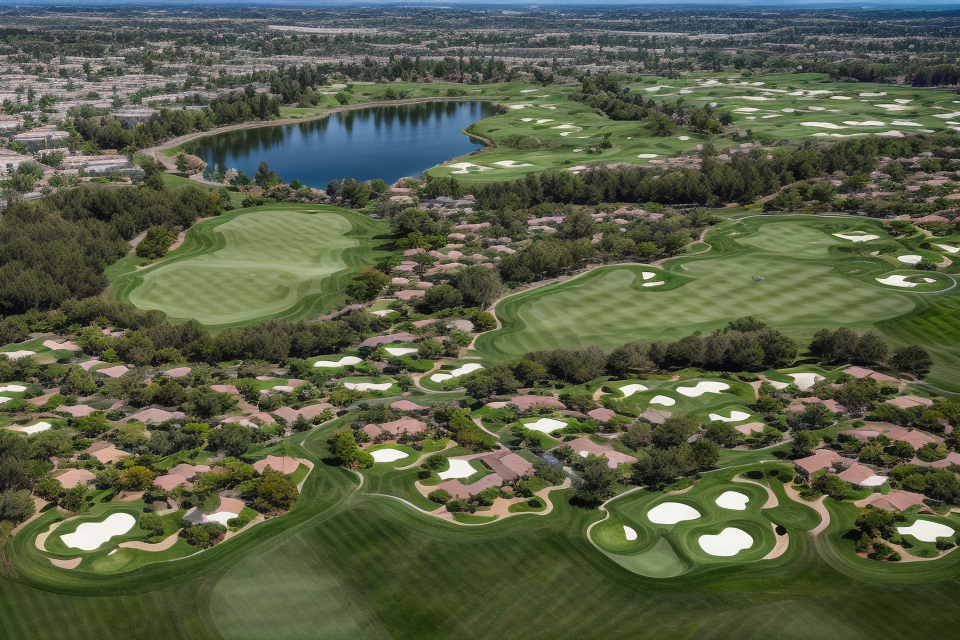
Are you considering buying a house on a golf course? Is it a smart investment or just a luxurious lifestyle choice? The idea of living on a golf course may seem enticing, with lush greenery and beautiful views, but is it worth the investment? In this article, we will explore the pros and cons of buying a house on a golf course, and help you make an informed decision. Whether you’re a golf enthusiast or just looking for a peaceful and picturesque community, read on to find out if a golf course home is the right investment for you.
Whether buying a house on a golf course is a smart investment depends on various factors such as personal preferences, financial goals, and market conditions. While owning a home on a golf course can offer a desirable lifestyle, it may also come with higher costs and potential risks. Golf course homes may have higher property taxes, homeowners association fees, and maintenance costs. Additionally, the value of the property may be subject to fluctuations in the golf industry, such as changes in popularity or economic conditions. Ultimately, whether buying a house on a golf course is a smart investment depends on a careful analysis of individual circumstances and market trends.
Factors to Consider When Buying a House on a Golf Course
When considering the purchase of a house on a golf course, there are several factors that should be taken into account. These factors can help you determine whether buying a house on a golf course is a smart investment or not.
- Location: The location of the golf course is an important factor to consider. A golf course located in a desirable area with easy access to amenities and transportation may be more valuable than one located in a less desirable area. Additionally, the proximity of the golf course to other golf courses can also affect its value.
- Course Condition: The condition of the golf course can also be a determining factor in its value. A well-maintained golf course with good facilities and a reputation for hosting successful tournaments may be more valuable than one that is poorly maintained or has a lack of success in hosting events.
- Home Prices: The prices of homes on the golf course can also affect its value. Homes that are priced too high may be difficult to sell, while homes that are priced too low may not provide a good return on investment. It is important to research the home prices in the area and compare them to the prices of homes on the golf course.
- Membership Fees: Golf courses often require membership fees for access to the course. These fees can vary depending on the type of membership and the level of access provided. High membership fees may deter potential buyers, while low membership fees may not provide a good return on investment.
- Golf Course Design: The design of the golf course can also be a factor in its value. A golf course designed by a well-known architect or with unique features may be more valuable than one with a generic design. Additionally, the layout of the course can affect its playability and attractiveness to golfers.
- Maintenance Costs: Golf courses require regular maintenance to keep them in good condition. The costs associated with maintaining the golf course can impact the value of the homes on the course. Homes on courses with high maintenance costs may be more difficult to sell or may not provide a good return on investment.
Overall, when considering the purchase of a house on a golf course, it is important to consider all of these factors to determine whether it is a smart investment or not. Researching the area, course condition, home prices, membership fees, design, and maintenance costs can help you make an informed decision.
Location and Accessibility
When considering buying a house on a golf course, location and accessibility are crucial factors to evaluate. Here are some key aspects to take into account:
- Proximity to major cities and attractions: Being close to major cities and popular attractions can be advantageous, as it can increase the property’s value and make it more attractive to potential buyers. It can also provide easy access to job opportunities, entertainment, and cultural experiences. However, properties located too close to busy areas may also have higher prices and increased competition.
- Transportation options: Easy access to public transportation, highways, or airports can enhance the property’s value and convenience. It can provide homeowners with various commuting options and facilitate travel to other locations. On the other hand, limited transportation options may create challenges for homeowners who need to frequently travel or commute to work.
- Local community amenities: The availability of local community amenities, such as schools, parks, shopping centers, and healthcare facilities, can significantly impact the property’s value and appeal. Homes located in areas with quality schools, for example, may have higher demand and appreciate more over time. Access to recreational facilities and green spaces can also contribute to a higher quality of life for homeowners. Conversely, properties in areas with limited amenities may have lower demand and may not appreciate as much over time.
Overall, considering the location and accessibility of a property on a golf course is crucial to make a smart investment. Homeowners should weigh the advantages and disadvantages of each factor to determine if the property aligns with their lifestyle and financial goals.
Golf Course Quality and Reputation
When considering buying a house on a golf course, it is crucial to evaluate the quality and reputation of the golf course itself. The following factors should be taken into account:
Golf Course Design and Maintenance
The design and maintenance of the golf course are critical in determining its quality. A well-designed golf course with challenging holes and unique features can enhance the property value of houses situated on it. On the other hand, a poorly designed golf course with monotonous holes and lackluster features can detract from the property value. Therefore, it is essential to evaluate the design and maintenance of the golf course before making a purchase.
Course Reputation Among Golfers
The reputation of the golf course among golfers is another critical factor to consider. A highly regarded golf course can increase the desirability of houses on it, leading to higher property values. However, a golf course with a poor reputation may not attract many golfers, which can negatively impact the property value. Therefore, it is crucial to research the reputation of the golf course among golfers and understand the factors that contribute to its reputation.
Course Accessibility for Residents
Accessibility to the golf course is also an essential factor to consider. A golf course that is easily accessible to residents can increase the usage and enjoyment of the course, leading to higher property values. However, a golf course that is difficult to access or requires a long drive may not be as appealing to potential buyers, leading to lower property values. Therefore, it is essential to evaluate the accessibility of the golf course to residents before making a purchase.
Property Value and Appreciation
When considering whether buying a house on a golf course is a smart investment, it’s important to examine the property value and appreciation potential. Here are some factors to consider:
- Historical property values and appreciation rates: Research the historical property values and appreciation rates for homes on the golf course and in the surrounding area. This can give you an idea of how the property value has increased over time and whether it’s been a sound investment in the past.
- Market trends and forecasts: Look at current market trends and forecasts for the area to determine whether the property value is likely to appreciate in the future. Factors such as population growth, job growth, and overall economic conditions can impact the housing market and influence the potential for appreciation.
- Factors that may impact property value: Consider any factors that may impact the property value, such as nearby development, changes in zoning laws, or the overall condition of the golf course. These factors can impact the long-term investment potential of the property.
By examining these factors, you can get a better understanding of the property value and appreciation potential for a house on a golf course, which can help you determine whether it’s a smart investment.
Golf Community Features and Amenities
When considering buying a house on a golf course, it’s important to evaluate the golf community features and amenities offered. These can have a significant impact on your overall experience and enjoyment of the community. Here are some factors to consider:
Types of Amenities Offered
One of the primary factors to consider when evaluating a golf community is the types of amenities offered. This can include a clubhouse, fitness center, swimming pool, tennis courts, and other recreational facilities. It’s important to assess the quality and condition of these amenities, as well as their accessibility and availability to residents.
For example, a golf community with a state-of-the-art fitness center and multiple swimming pools may be more appealing to buyers who prioritize fitness and wellness. On the other hand, a community with top-notch tennis courts may be more attractive to buyers who enjoy playing tennis.
Quality and Variety of Community Events and Activities
Another factor to consider is the quality and variety of community events and activities offered. This can include social events, tournaments, and other recreational activities. It’s important to assess the frequency and variety of these events, as well as their appeal to potential buyers.
For example, a golf community that hosts weekly social events and tournaments may be more appealing to buyers who enjoy socializing and competing with other golfers. On the other hand, a community that offers a wider variety of recreational activities, such as hiking and biking, may be more attractive to buyers who enjoy outdoor activities.
Access to Nearby Recreational Facilities and Attractions
Finally, it’s important to consider the access to nearby recreational facilities and attractions. This can include parks, hiking trails, shopping centers, and other entertainment options. It’s important to assess the proximity and quality of these facilities, as well as their appeal to potential buyers.
For example, a golf community located near a major city may offer easy access to a wide variety of entertainment options, such as restaurants, museums, and concert venues. On the other hand, a community located in a more rural area may offer easy access to outdoor recreational activities, such as hiking and fishing.
Overall, when evaluating a golf community’s features and amenities, it’s important to consider the types of amenities offered, the quality and variety of community events and activities, and the access to nearby recreational facilities and attractions. These factors can have a significant impact on your overall experience and enjoyment of the community, and can ultimately influence your decision to buy a house on a golf course.
Financial Considerations
When considering purchasing a house on a golf course, there are several financial factors to take into account. These factors include homeowners association (HOA) fees and restrictions, property taxes, and mortgage options and qualification requirements.
- Homeowners Association (HOA) Fees and Restrictions
Homeowners association (HOA) fees are a common aspect of living in a community with a golf course. These fees help maintain the course and the common areas within the community. HOA fees can vary greatly depending on the specific community and the services provided. It is important to carefully review the HOA fees and restrictions before purchasing a home on a golf course.
Some HOAs may also have restrictions on the type of home improvements that can be made, the use of the property, and the number of renters allowed on the property. It is important to be aware of these restrictions and ensure they align with your plans for the property.
- Property Taxes
Property taxes can also be a significant factor when purchasing a home on a golf course. In some areas, property taxes may be higher due to the value of the land and the amenities provided. It is important to research the property tax rates in the area and consider how they may impact your budget.
- Mortgage Options and Qualification Requirements
Mortgage options and qualification requirements can also play a role in the decision to purchase a home on a golf course. Some lenders may have specific requirements for properties located on a golf course, such as additional insurance or higher down payment requirements. It is important to research the mortgage options available and compare rates and terms to find the best option for your financial situation.
Overall, financial considerations are an important aspect of purchasing a home on a golf course. It is important to carefully review the HOA fees and restrictions, property taxes, and mortgage options before making a decision. By taking these factors into account, you can determine if purchasing a house on a golf course is a smart investment for your financial situation.
The Pros and Cons of Investing in a Golf Course Home
========================================================
Investing in a home situated on a golf course can be an appealing prospect for many homebuyers. The tranquil surroundings, stunning views, and recreational opportunities that come with living on a golf course may seem like an ideal situation. However, before making such an investment, it is essential to weigh the pros and cons carefully.
Pros of Investing in a Golf Course Home
Appreciation Potential
One of the primary advantages of investing in a home on a golf course is the potential for appreciation. Properties located in desirable areas, such as golf courses, often experience an increase in value over time. This appreciation can provide a significant return on investment for homeowners looking to sell their property in the future.
Exclusive Community
Living in a golf course community offers a sense of exclusivity and prestige. These communities often have high-end amenities, such as clubhouses, fitness centers, and swimming pools, which can enhance the overall living experience. Being part of an exclusive community can also provide a sense of security and a close-knit community for residents.
Recreational Opportunities
One of the most significant benefits of living on a golf course is the access to recreational opportunities. Residents can enjoy playing golf, as well as other outdoor activities such as hiking, biking, and walking. This access to outdoor recreation can enhance the quality of life for residents and provide a sense of well-being.
Cons of Investing in a Golf Course Home
Higher Costs
One of the main drawbacks of investing in a home on a golf course is the higher cost. Properties located on golf courses tend to be more expensive than those in other areas, which can make them unaffordable for some buyers. Additionally, the cost of living in a golf course community, including association fees and other expenses, can add to the overall cost of ownership.
Maintenance Costs
Another potential downside of investing in a golf course home is the higher maintenance costs. Golf courses require extensive upkeep, including regular mowing, irrigation, and landscaping. These costs can be passed on to homeowners, leading to increased maintenance expenses.
Limited Resale Market
Finally, investing in a home on a golf course can limit the resale market. While golf course communities often have a strong appeal to certain buyers, they may not appeal to others. This can limit the pool of potential buyers when it comes time to sell the property, which can impact the resale value and make it more difficult to find a buyer.
In conclusion, investing in a home on a golf course can offer several benefits, including appreciation potential, access to exclusive communities, and recreational opportunities. However, it is essential to weigh these benefits against the potential drawbacks, including higher costs, maintenance costs, and limited resale market. Before making an investment, it is crucial to carefully consider all factors and determine whether investing in a golf course home is the right decision for individual circumstances.
Pros
Potential for property appreciation
Purchasing a house on a golf course can be a wise investment due to the potential for property appreciation. The location of these homes, often situated in affluent neighborhoods, can lead to increased demand and higher resale values. This demand is fueled by the desirable lifestyle and amenities that come with living on a golf course, such as access to top-tier golf courses, scenic views, and recreational opportunities.
Exclusive and desirable community amenities
Investing in a golf course home grants access to exclusive and desirable community amenities. These amenities often include access to the golf course itself, as well as clubhouses, fitness centers, swimming pools, and other recreational facilities. These features can significantly enhance the overall living experience and increase the appeal of the property to potential buyers.
High-quality golf course access and experiences
Living on a golf course provides residents with high-quality access to golf courses and experiences. Homeowners can enjoy playing golf on the course, taking in the picturesque views, and socializing with fellow golf enthusiasts. Additionally, having a golf course in close proximity can increase the value of the property and make it more attractive to potential buyers who are interested in golfing as a recreational activity.
Cons
- Higher property prices and associated costs
One of the most significant drawbacks of investing in a home on a golf course is the higher property prices and associated costs. Homes located on golf courses typically come with a premium price tag due to their unique location and the amenities they offer. Additionally, there may be additional costs associated with property maintenance, upkeep of the golf course, and HOA fees. These costs can add up and significantly impact the overall return on investment. - Limited privacy and seclusion
Another downside of investing in a golf course home is the limited privacy and seclusion. Golf courses are often open to the public, which means that neighbors and passersby may have unobstructed views of your property. This lack of privacy can be a concern for some homeowners, particularly those who value their privacy and seclusion. - Potential restrictions and HOA rules
Homes located on golf courses may also be subject to restrictive covenants and HOA rules, which can limit the owner’s ability to make changes or improvements to the property. These restrictions can impact the resale value of the property and limit the owner’s ability to customize the home to their liking. Additionally, HOA fees can be a significant expense and may not be covered by the property taxes, which can be a disadvantage for some homeowners.
Overall, while investing in a home on a golf course can offer many benefits, it is essential to consider these potential drawbacks before making a purchase. It is crucial to weigh the pros and cons carefully and to understand the potential impact of higher property prices, limited privacy, and potential restrictions and HOA rules on the overall return on investment.
FAQs
1. What are the benefits of buying a house on a golf course?
There are several benefits to buying a house on a golf course. For one, living on a golf course can provide a beautiful and peaceful view, as well as access to golfing activities. Additionally, properties on golf courses tend to have larger lots and more privacy than those in other areas. Furthermore, buying a house on a golf course can also increase your property value and rental appeal.
2. Are there any drawbacks to buying a house on a golf course?
One potential drawback to buying a house on a golf course is the cost. Properties on golf courses tend to be more expensive than those in other areas, which may be out of reach for some buyers. Additionally, living on a golf course may not be for everyone, as it can be noisy and disruptive to have golfers playing nearby. Furthermore, golf courses can also be subject to closure, which can negatively impact the value of the properties surrounding them.
3. How does the location of the golf course affect the investment?
The location of the golf course can have a significant impact on the investment potential of buying a house on a golf course. For example, if the golf course is located in a desirable area with easy access to amenities and attractions, the property may appreciate in value over time. On the other hand, if the golf course is located in a less desirable area, the property may not appreciate as much or may even depreciate in value.
4. What are the potential rental opportunities for a house on a golf course?
A house on a golf course can offer great rental opportunities, particularly for golf enthusiasts or businesses looking to host events or retreats. Additionally, properties on golf courses tend to have larger lots and more privacy than those in other areas, which can be attractive to renters looking for a peaceful and relaxing getaway. However, it’s important to note that rental potential can vary depending on the location and demand in the area.
5. How does the maintenance of the golf course affect the investment?
The maintenance of the golf course can have a significant impact on the investment potential of buying a house on a golf course. If the golf course is well-maintained and popular, it can help to increase the value and rental appeal of the surrounding properties. On the other hand, if the golf course is poorly maintained or struggling financially, it can negatively impact the value and rental potential of the surrounding properties.
6. What factors should I consider before buying a house on a golf course?
Before buying a house on a golf course, it’s important to consider several factors, including the cost, location, rental potential, and maintenance of the golf course. Additionally, it’s important to research the history of the golf course and the surrounding area, as well as any potential zoning changes or development plans that could impact the value of the property. It’s also a good idea to consult with a real estate agent who is familiar with the area and can provide valuable insights and advice.


